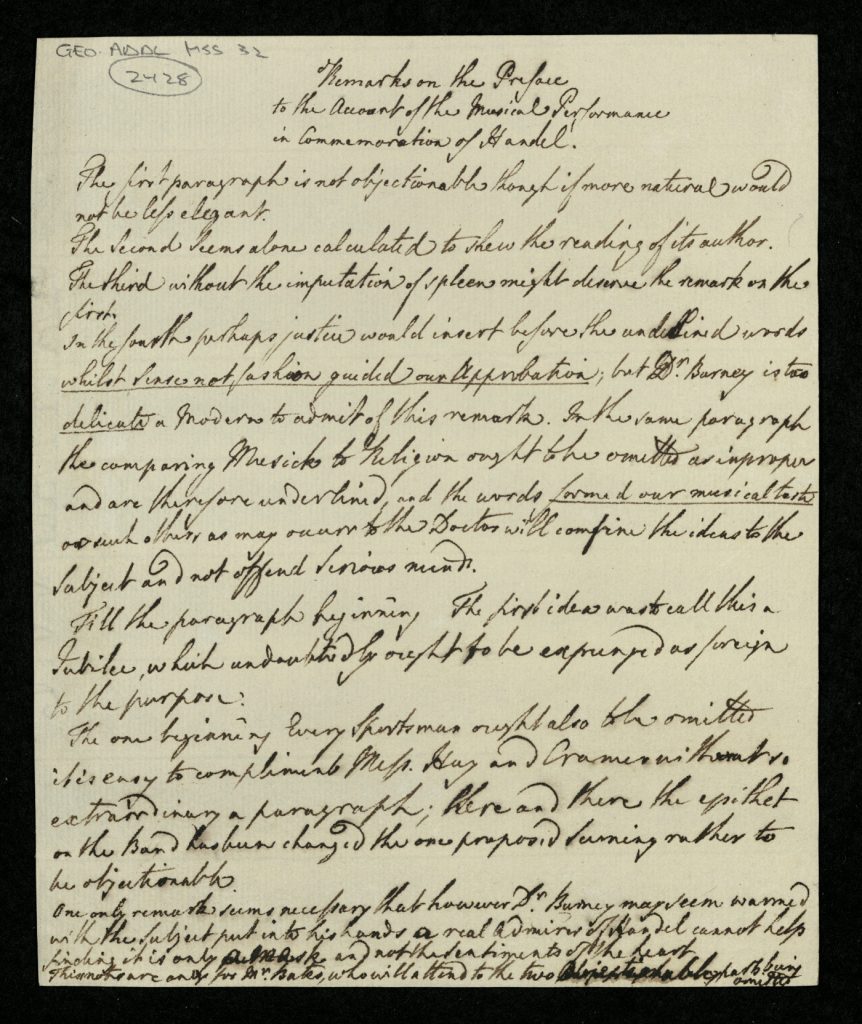‘Remarks on the Preface to the Account of the Musical Performance in Commemoration of Handel’, George III
Professor Matthew Head, Department of Music, Centre for Eighteenth-Century Studies, King’s College London
Jump to Essay Transcription & Images
This brusque memo in the hand of George III is a smoking gun. It is addressed to one Joah Bates, a naval administrator, antiquarian musician and Handel-enthusiast who directed the epochal performances of Handel’s music that took place in Westminster Abbey and the (no longer existing) Parthenon theatre in 1784 to mark (among other anniversaries) 25 years since the composer’s death in 1759.
Using Bates as a go-between, the King requires revisions to the commemorative write-up of the occasion entrusted to Charles Burney, a pioneer of music-historical writing in English (and father of Francis Burney, the celebrated novelist). Specifically, the King required of Burney a more celebratory, pro-Handel tone, observing that ‘Dr. Burney may seem warmed with the subject put into his hands [but] a real admirer of Handel cannot help finding it is only a mask and not the sentiments of the heart’. This elegantly-worded call for greater enthusiasm reflected not only the King’s personal partiality for Handel’s music but the institutionalisation of the composer: Handel’s music was a dynastic soundtrack, associated with the patronage of his George II, with state occasions and – through its public and charitable use – with British identity as Protestant, manly and civic minded. Keen to associate his reign with these values, and more broadly with the nationalist trope of the flourishing of the arts and sciences, the King attended and lent royal sanction to the Handel commemoration whose massed musical resources, involving over 500 musicians, marshalled a ceremony of unity and strength in the wake of the loss of the north American colonies (a feature stressed in earlier scholarly comment).
But these were tense times for questions of the proper limits of royal influence, following the defeat of the East-India Bill in the House of Lords through the King’s threats to sanction disloyal members and his dissolution of the Fox-North coalition at the end of 1783. Burney’s bristling indignation at The King’s influence was politically topical.
Burney also resented the loss of his playful and subtle style, fearing – as he explained to Twinning – that paeans of exclusive praise for one composer and nation would jeopardise his reputation for rational impartiality and ‘politeness’. As he continued indignantly: ‘I will not write like an Apostate—I will not deny my liberal principles—I will not abuse the lovers of the best Music of Italy & Germany, & say that they are only admired through fashion, & want of good taste & judgment.’ The newly discovered memo reveals the nature of the King’s influence – several of his turns of phrase and recommendations were incorporated – but also provides a new way of reading the published Account: not as stable and unified, but riven with ideologically significant contradiction, outwardly celebrating the celebration, but falling short of unqualified enthusiasm; praising the achievements of contemporary musicians but questioning whether veneration of past achievements might stifle the future of music history.
Transcription
Transcription provided is the raw transcription, initial product of student transcribers. Text is not corrected nor proofed.
Download full raw transcription: RA GEO/ADD/32/2428_Raw Transcription (pdf)

